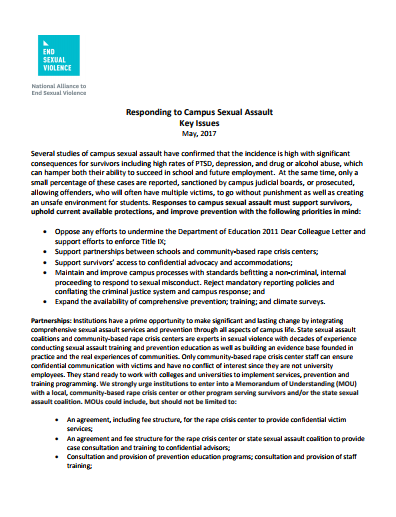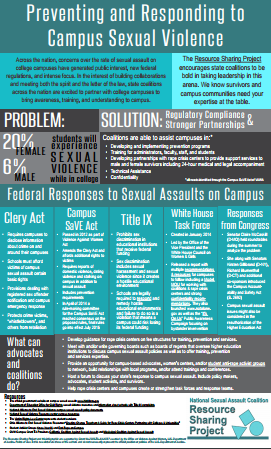Resources Library: Brochures
Start a Search:
Q&A for Advocates and Attorneys Serving Immigrant Survivors of Gender-based Violence
Who is this document for?
This is a Question and Answer (Q&A) for domestic violence and sexual assault (DV/SA) victim advocates and attorneys who are serving immigrant survivors of gender-based violence, both undocumented survivors and survivors who may be eligible for VAWA self-petitions, U visas, T visas or applying for gender-based asylum. Keep in mind that this information may change as we learn more about the plans of the incoming administration. This document is not legal advice or authority, but rather, it is for informational purposes only, not for media distribution.
Why is this important for survivor safety?
President-elect Trump pledged to make several sweeping changes to immigration policy within his first 100 days. Several of those changes are related to the potential termination of the Deferred Action for Childhood Arrivals (DACA) program and increased enforcement and stricter penalties for those with criminal records and those who re-enter after a previous removal order. As of right now, we do not know whether the incoming administration will be specifically looking to make changes to survivor-based immigration relief. Nonetheless, staying informed about the national and local law enforcement policies and practices is essential to safety planning with survivors of gender-based violence (domestic violence, sexual assault, trafficking). If you are a victim service provider who works with immigrants and want more information about local law enforcement immigration policies and practices, please contact the Domestic and Sexual Violence Coalitions in your state.
Read and download the English Q&A document here.
Read and download the Spanish Q&A document here.
Questions this document answers:
This document was prepared by Americans for Immigrant Justice, Asian Pacific Institute on Gender-Based Violence, ASISTA Immigration Assistance, Casa de Esperanza: National Latin@ Network; Center for Gender & Refugee Studies, Freedom Network USA, Immigrant Legal Resource Center, Immigration Center for Women and Children (ICWC), Julie Marzouk Assistant Clinical Professor, Dale E. Fowler School of Law at Chapman University, Minnesota Coalition for Battered Women, National Immigrant Justice Center, Tahirih Justice Center, We Belong Together.
Resources from the National Center on Elder Abuse
The National Center on Elder Abuse (NCEA) has collected all of its products (reports, webinars, podcasts, databases, etc.) in one location for easy access and availability.
Click the following links for more information on:
Elder Rights Resources - Prevention of elder abuse, legal assistance, world elder abuse awareness, and more
NCEA publications - These include information on LGBT elder concerns, financial abuse and exploitation, culturally-specifc resources, persons with disabilities, and more
Virginia-specifc state resources for elders
Supports and Tools for Elder Abuse Prevention
The Reframing Elder Abuse Project - a communications strategy and toolkit that reimagines our cultural dialogue on elder abuse
Responding to Campus Sexual Assault Key Issues (May 2017) from the National Alliance to End Sexual Violence

Several studies of campus sexual assault have confirmed that the incidence is high with significant consequences for survivors including high rates of PTSD, depression, and drug or alcohol abuse, which can hamper both their ability to succeed in school and future employment. At the same time, only a small percentage of these cases are reported, sanctioned by campus judicial boards, or prosecuted, allowing offenders, who will often have multiple victims, to go without punishment as well as creating an unsafe environment for students. Responses to campus sexual assault must support survivors, uphold current available protections, and improve upon prevention.
RSP Preventing and Responding to Campus SA Infographic

In this ReShape, the Resource Sharing Project created an infographic for coalitions about federal rules and regulations around campus sexual assault.
Title IX and Dating Abuse from Break the Cycle
Title IX of the Education Amendments of 1972 (“Title IX”) is a Federal civil rights law prohibiting discrimination on the basis of sex in any federally funded education program or activity. While public focus lately has been placed on better implementing Title IX at colleges and universities, very little has been dedicated to how the law should work in secondary schools. This document addresses the need for efficient Title IX implementation in secondary schools.

